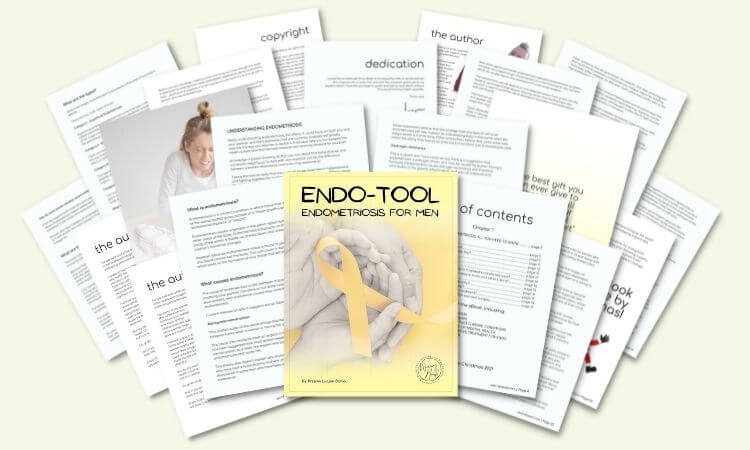How Endometriosis Affects Women’s Job Finding?
Being the husband of a woman with stage 4 endometriosis I can quickly answer how endometriosis affects women’s job finding.
Endometriosis can impact women’s job finding due to potential biases from employers who may lack understanding of the condition. The lack of empathy and awareness about the challenges posed by endometriosis can contribute to difficulties in securing employment opportunities for affected individuals.
I’ve learned that during over a decade of my wife’s experiences, and my personal experience of talking to her employers. Even though I answered in a nutshell in one paragraph, this is far more complicated and requires more in-depth discussion.
This is why I decided to write this article. Read till the end not to miss anything you may find important for your partner, or (if you are the one who suffers from endo) yourself.
- Why Are Women Struggling to Find Employment with Endometriosis?
- Are Women with Endometriosis Accepted in the Workplace?
- How Does Endo Affect Consistency in Balancing Work?
- How Does Endometriosis Impact Women Taking Time Off Work?
- Are Breaks Stigmatized in Endometriosis and Employment?
- Is Job Stability Affected by Endometriosis?
- Conclusion on How Endometriosis Affects Women's Job Finding?
Why Are Women Struggling to Find Employment with Endometriosis?
To answer how endometriosis affects women’s job finding (for those who don’t know) we need to understand the condition. So, what is endo?
Endometriosis, a condition that affects one in ten women worldwide, remains woefully misunderstood and disproportionately impacts females’ employment opportunities. Despite repeated cries from the medical community and countless women who suffer silently, society as a whole seems stubbornly resistant to acknowledging the real impact of this validity. Why are we not asking the necessary question: Is endometriosis a disability?
The pernicious effects of endometriosis are not confined to physical ailments alone; they infiltrate every aspect of life, particularly employment. The debilitating pain and other symptoms associated with the condition can make it virtually impossible for those suffering to maintain a consistent work schedule.
It’s high time we acknowledge that finding suitable job opportunities for these women is crucial. Some might argue that there are best jobs for endometriosis sufferers; perhaps positions with flexible hours or remote work options.
However, this perspective fails to recognise that not everyone has access to such opportunities or that their skills may lie elsewhere. Moreover, should women be forced into specific careers due to their health conditions?
Shouldn’t we be striving for an inclusive workforce where individuals are judged based on their skills and qualifications rather than their health status? Unfortunately, current employment law seems grossly inadequate in addressing these challenges.
There’s an urgent need for legal provisions specifically pertaining to conditions like endometriosis – perhaps something akin to an Endometriosis Disability Act – which recognizes the condition as a disability and provides protection against discrimination. We need workplaces to become ‘endometriosis friendly employers’.
This doesn’t just mean offering sick leave or being understanding when someone needs time off work – it means providing comprehensive healthcare options, flexible working arrangements, and fostering an environment where women feel safe discussing their health without fear of judgment or reprisal. In short, navigating job finding whilst managing endometriosis is no walk in the park – it’s more akin to traversing a minefield whilst blindfolded.
This issue is symptomatic of a larger societal problem: the refusal to acknowledge women’s health issues as legitimate and worthy of consideration. It’s high time we shed light on this invisible scourge and create an equitable employment landscape for all, regardless of their health status.
Before we move on, if you want to learn more about endometriosis, I wrote an “Endo-Tool, Endometriosis for Men” e-Book.
You can get the 1st Chapter of the e-Book for FREE, and if you like it, you’ll get a Whopping 33% Discount on the Whole Book, plus discounts on other helpful tools. You have nothing to lose but a lot to gain!
The first chapter alone contains all the comprehensive medical knowledge about endometriosis, including:
- What is endometriosis?
- What are the symptoms?
- What causes endometriosis?
- What does endometriosis look like?
- What are the stages?
- What are the types?
- What is adenomyosis and how is it related to endometriosis?
- Why do some women develop severe endo and others don’t?
- Does endometriosis cause infertility?
- How is endometriosis diagnosed?
- Do types and stages affect the treatment?
- Recurrence of endometriosis after excision surgery.
FREE Chapter of “Endo-Tool”
Endometriosis e-Book for Men

Exploring Stereotypes and Misconceptions
In the realm of employment, women with endometriosis often find themselves contending with prevalent stereotypes and misconceptions. Uninformed perspectives may assume that endometriosis is a minor ailment, disregarding the severe impact it can have on daily life. Dispelling these stereotypes is crucial for creating a workplace that understands the nuanced challenges faced by these women. Educating colleagues and employers about the complexities of endometriosis fosters empathy and ensures a supportive work environment.
Navigating Prejudice during Job Interviews
Job interviews can become daunting for women with endometriosis as they navigate potential prejudices. The fear of being judged or misunderstood often accompanies the necessity to disclose health-related needs. Striking a balance between transparency about health challenges and maintaining professional integrity poses a unique challenge. Navigating this prejudice requires not only resilience from the applicant but also a shift in societal perceptions and workplace attitudes to ensure fair treatment in the hiring process.
Addressing Discrimination in the Hiring Process
Addressing discrimination in the hiring process is integral to creating equal opportunities for women with endometriosis. From unconscious biases to overt discrimination, the hiring phase can be rife with challenges. Implementing policies that promote inclusivity, educating hiring managers about the realities of endometriosis, and fostering a culture of diversity can collectively contribute to dismantling discriminatory practices.
The Role of Endo-Related Health Gaps
Endometriosis introduces health gaps that impact a woman’s ability to consistently perform in the workplace. These health gaps may result in unpredictable absences, fluctuating productivity, and the need for accommodations. Recognizing the role of endo-related health gaps is vital for employers and colleagues to develop supportive strategies that accommodate the unique challenges faced by women with endometriosis.
Overcoming Work Environment Barriers
Women with endometriosis often encounter barriers within the work environment that hinder their professional growth. These barriers may include a lack of understanding from colleagues, inadequate accommodations, or insufficient support from superiors. Overcoming these barriers necessitates proactive efforts in raising awareness, fostering a culture of empathy, and implementing policies that accommodate the specific needs of individuals grappling with endometriosis. Creating an inclusive and understanding work environment is essential for empowering women with endometriosis to thrive in their careers despite the challenges they may face.

Are Women with Endometriosis Accepted in the Workplace?
The next step in our understanding of how endometriosis affects women’s job finding is to acknowledge that there’s a viperous silence surrounding the acceptance of women with endometriosis in the workplace. Yes, it’s 2022, and we are still grappling with this issue.
A stinging reality that is as infuriating as it is dismaying! It’s time we ended this under-the-carpet sweeping approach and addressed the pachyderm in the room.
You see, endometriosis isn’t a common cold that you can simply shake off and get back to work after gulping down a couple of aspirins; it’s a debilitating condition that could keep one curled up in pain for days on end. It comes uninvited, stays undeterred, and leaves only in its own sweet time.
But does our society recognize this? NO!
And oh boy doesn’t it reflect in our workplaces? We talk about the best jobs for endometriosis.
Let me tell you what – there is no such thing! Jobs shouldn’t be labeled ‘endometriosis-friendly’ or not; workplaces should be.
Every woman deserves every job opportunity irrespective of her medical condition – Endometriosis or otherwise. Then you come across these fancy phrases like ‘endometriosis friendly employer’.
What does that even mean? Should an employer be applauded for being sensitive to their employee’s medical condition?
Isn’t empathy supposed to be an inherent human trait? Why are basic human rights being turned into PR opportunities?
Again, don’t even get me started on ‘endometriosis job opportunities’. The very phrase reeks of discrimination.
Women with endo aren’t charity cases waiting for handouts; they don’t need specially tagged ‘opportunities’. They need fairness, equality, understanding – just like any other individual out there!
So where does all this leave us with regards to employment law? Are women protected against discrimination due to their struggle with endometriosis under the Endometriosis Disability Act?
Oh wait, there is no such thing! We’re left floundering, grasping at straws in a system that should be safeguarding us – the very essence of irony.
To put it bluntly, endometriosis is a disability. But not in the way you think.
It’s not the disease that disables women; it’s society’s ignorance and indifference. It’s high time we changed this narrative and stood up for those silently suffering in their cubicles or zoom meetings, wondering if their pain is even valid.
Are women with endometriosis accepted in the workplace? The answer shouldn’t just be a resounding yes; it should be an outraged “How dare you even ask?”
Fostering an Inclusive Work Culture
Fostering an inclusive work culture is paramount to supporting women with endometriosis. An inclusive workplace acknowledges and accommodates diverse needs, promoting a sense of belonging for all employees. For women dealing with the challenges of endometriosis, an inclusive culture ensures that their unique circumstances are understood and respected. This involves creating an environment where differences are celebrated, and employees feel comfortable disclosing health-related concerns without fear of judgment.
Breaking Down Stigmas Surrounding Endometriosis
Breaking down stigmas surrounding endometriosis is a crucial step in cultivating a workplace that values openness and understanding. Many women with endometriosis face societal misconceptions, and these stereotypes often permeate the workplace. By fostering awareness and education, workplaces can actively challenge these stigmas, creating an environment where individuals with endometriosis are neither stigmatized nor marginalized.
Empathy and Understanding Among Colleagues
Empathy and understanding among colleagues play a pivotal role in supporting women with endometriosis. Colleagues who are well-informed and empathetic contribute to a positive work environment. This involves cultivating a culture where open communication is encouraged, allowing for discussions about health challenges without judgment. A workplace where colleagues show genuine understanding fosters a sense of community and support, positively impacting the overall well-being of women dealing with endometriosis.
The Importance of Workplace Policies
Recognizing the importance of workplace policies is fundamental in providing tangible support for women with endometriosis. Well-crafted policies ensure that accommodations are in place, addressing the unique needs that may arise due to this health condition. Whether it involves flexible work hours, remote work options, or additional health-related benefits, policies tailored to support individuals with endometriosis contribute significantly to creating an inclusive and supportive workplace.
Navigating Social Acceptance and Support
Navigating social acceptance and support within the workplace is essential for the well-being of women with endometriosis. Beyond policies, the social fabric of the workplace plays a crucial role in determining how individuals are perceived and treated. Encouraging a culture of acceptance and support involves fostering open conversations, eradicating judgment, and promoting an environment where individuals feel comfortable seeking and receiving the support they need. In such a workplace, social acceptance becomes a powerful tool in mitigating the challenges associated with endometriosis, ensuring that women feel valued and understood.

How Does Endo Affect Consistency in Balancing Work?
What else can I say about how endometriosis affects women’s job finding? Well, the toll endometriosis takes on a woman’s life is truly incomprehensible. It gnaws at her daily existence, eroding her capacity to remain consistent in balancing work.
The unpredictability of the condition’s symptoms turns every scheduled task into a gamble, like dancing on a tightrope with the abyss of debilitating pain lurking beneath. Now consider the so-called endometriosis friendly employers that apparently exist.
Sure, they claim to understand and sympathize with your condition, but how can they truthfully do so when endometriosis varies so wildly from woman to woman? One day, you’re feeling fine and working at full capacity.
The next day you might be immobilized by pain or drained by fatigue. These ‘friendly’ employers may have good intentions, but let’s face it – a business needs reliable employees.
Then there’s this idea of an ‘endometriosis disability act.’ Sounds promising right? A piece of legislation specifically designed to protect women suffering from endometriosis in the workplace.
But here’s the question: Is endometriosis truly recognized as a disability? Because only then could women affected by it benefit from any sort of disability law protections at their jobs.
Moreover, which are these elusive best jobs for endometriosis? This term is bandied about as if there is some grand list of professions where one can simply work around their chronic illness without hindrance or discrimination.
But let me tell you this: Endo doesn’t care about your job description or title! Whether you’re an officer worker or a CEO, when it flares up, it paralyzes you all the same!
And yet we expect these women to find suitable job opportunities amidst all this chaos! When discussing job opportunities for women with endo, more often than not what they are really talking about is ‘acceptable levels’ of exploitation and discrimination rather than genuine inclusivity and understanding.
In the ideal world, we would have endometriosis firmly embedded within our employment laws. We would have institutions that understand and account for the unique challenges posed by this condition.
Unfortunately, in reality, we are far from achieving that level of sensitivity and comprehension. And it’s high time we changed that.
Managing Productivity Fluctuations
Managing productivity fluctuations becomes a daily challenge for women with endometriosis, as the condition often leads to unpredictable changes in energy levels and overall well-being. Coping with the ebb and flow of productivity requires flexibility from both the individual and their workplace. Implementing strategies such as prioritizing tasks, efficient time management, and open communication with colleagues can help navigate the challenges posed by productivity fluctuations, ensuring that essential work is accomplished while accommodating the impact of endometriosis on daily life.
Navigating Unpredictable Health Episodes
Women with endometriosis face the unpredictable nature of health episodes, which can disrupt work schedules and impact overall performance. Navigating these unpredictable health episodes involves developing a proactive plan for when challenges arise. Clear communication with supervisors and colleagues about potential disruptions, along with having contingency plans in place, contributes to a supportive work environment. By fostering understanding and empathy, individuals with endometriosis can navigate health episodes more effectively, minimizing the impact on their work and maintaining a sense of control over their professional responsibilities.
Balancing Work Commitments with Health Needs
Balancing work commitments with health needs is a delicate juggling act for women with endometriosis. Striking the right balance requires transparent communication with employers about health constraints and the establishment of a supportive work environment. Employers can contribute by offering flexible work arrangements, understanding the need for occasional adjustments, and creating a culture that values employee well-being alongside work commitments. Achieving this balance is essential for the overall health and job satisfaction of individuals managing endometriosis.
Strategies for Maintaining Consistency
Maintaining consistency amid the challenges of endometriosis requires a thoughtful approach and the implementation of effective strategies. Women with endometriosis may find success in creating a structured routine, breaking tasks into manageable segments, and utilizing tools for time management. Additionally, having open communication with supervisors and colleagues about the need for consistency and exploring supportive workplace arrangements can contribute to a more predictable and sustainable work routine.
The Impact of Endo on Long-Term Career Goals
Endometriosis can significantly impact long-term career goals for women as they navigate the challenges posed by the condition. The uncertainty surrounding health, potential career interruptions, and the need for flexibility can influence career trajectories. Coping with these challenges involves setting realistic goals, adapting career plans based on health considerations, and seeking workplaces that prioritize inclusivity and support. By acknowledging the impact of endometriosis on long-term career goals, individuals can make informed decisions about their professional paths, ensuring alignment with both their aspirations and health needs.

How Does Endometriosis Impact Women Taking Time Off Work?
Let’s continue our quest to learn how endometriosis affects women’s job finding…
Endometriosis, a condition shrouded in a cloud of misunderstanding and prejudice, creates an array of difficulties for women in the workplace. An often unspoken reality is the impact it has on women taking time off work. The insidious nature of this disease, with its unpredictable flare-ups and intense discomfort, does not adhere to standardized corporate leave policies.
It’s high time we addressed the elephant in the room: is endometriosis a disability? Yes!
It may not be universally recognized as such but let’s call it like it is. It directly impedes many women from conducting their work effectively.
Some might argue that this condition doesn’t qualify as a disability because it isn’t visible like a broken arm or leg – but since when did we start equating visibility with validity? In an ideal world, every employer would be an endometriosis-friendly employer.
However, the sad reality is that many workplaces lack understanding and empathy towards employees dealing with this condition. It’s almost as if they think these women are fabricating their pain for fun or using it as an excuse to take frequent breaks.
This ignorance creates an environment where sufferers feel stigmatized for something beyond their control. Now let’s talk about laws – specifically employment law connected to endometriosis.
Globally speaking, there isn’t much legislation dedicated to protecting employees with endometriosis from discrimination or unfair treatment in the workplace. The Endometriosis Disability Act doesn’t exist yet – though I wish it did – only further highlighting society’s dismissive attitude towards this debilitating illness.
Are there endometriosis job opportunities out there? Sure, certain professions may offer more flexibility than others—making them potentially better jobs for people managing endo—but should we really limit ourselves due to something we didn’t ask for?
Women shouldn’t have to compromise their career ambitions due to a health condition they can’t control! With the right support and awareness, any job can be an ‘endometriosis job’.
The problem here is not the lack of opportunities for women with endometriosis, but rather the lack of understanding and empathy from employers. Society needs to wake up and see endometriosis for what it truly is: a painful, debilitating disease that deserves recognition and support in every aspect of life—including employment.
Addressing the Stigma of Taking Sick Leave
Addressing the stigma of taking sick leave is crucial for individuals with endometriosis who may face judgment or misunderstanding from colleagues or supervisors. Creating an open dialogue about health needs and fostering a workplace culture that recognizes the importance of mental and physical well-being can help dispel misconceptions surrounding sick leave. By addressing this stigma, individuals can feel more empowered to prioritize their health without fear of professional repercussions.
Communicating Health Needs with Employers
Effectively communicating health needs with employers is essential for individuals managing endometriosis. Open and transparent discussions about the nature of the condition, potential challenges, and required accommodations foster understanding. Employers who are informed about their employees’ health needs can provide the necessary support, whether it involves flexible work hours, remote work options, or other accommodations. This communication is a two-way street, contributing to a workplace where both parties work collaboratively to ensure the well-being of the individual with endometriosis.
Balancing Career and Health Priorities
Balancing career and health priorities becomes a daily challenge for those with endometriosis. Striking the right balance involves setting realistic expectations, prioritizing tasks, and making decisions that align with both career aspirations and health requirements. Employers who acknowledge the importance of this balance contribute to a healthier and more productive work environment. Individuals navigating endometriosis may find success in advocating for themselves, seeking supportive workplaces, and fostering a personal commitment to well-being alongside career goals.
Strategies for Mitigating Career Disruptions
Mitigating career disruptions caused by endometriosis involves proactive planning and strategic decision-making. Individuals can employ strategies such as creating contingency plans for health setbacks, building a strong support network, and staying informed about workplace policies that can aid in managing disruptions. Employers, in turn, can contribute by implementing flexible policies and providing a supportive framework that assists individuals in maintaining career momentum despite intermittent challenges.
Seeking Understanding from Employers and Peers
Seeking understanding from employers and peers is essential for individuals grappling with endometriosis. This involves fostering open communication channels to educate colleagues about the condition, its impact, and the potential need for accommodations. Employers who prioritize understanding contribute to a more empathetic workplace culture, where individuals feel supported and valued. By seeking understanding, individuals with endometriosis can break down barriers, reduce stigma, and create an environment where their health needs are recognized and respected.

Are Breaks Stigmatized in Endometriosis and Employment?
And what about stigma? How endometriosis affects women’s job finding in terms of the stigma?
It is both a pernicious and insidious reality, the stigmatization of breaks in the context of endometriosis and employment. It’s as if society has collectively fixed its gaze upon individuals with conditions like endometriosis, creating an environment where they are made to feel guilty for prioritizing their health.
We are laboring under the misapprehension that these necessary pauses signify weakness or incompetence. This grossly unfair sentiment is further exacerbated by the fact that there isn’t an Endometriosis Disability Act in place to protect these women.
The failure to recognize endometriosis as a disability sends out a clear message: “Your pain isn’t real enough.” This is despite the evidence proving that this condition can be debilitating, compromising not only an individual’s work capabilities but their overall quality of life. Furthermore, it’s high time we asked ourselves why there aren’t more endometriosis-friendly employers out there?
Are businesses so focused on their bottom line that they cannot accommodate the needs of their employees who are affected by this condition? This lack of understanding and empathy stands in stark contrast with what employment law ideally aims to achieve – providing fair opportunities for all employees regardless of personal circumstances.
It brings me great frustration when I think about how many women have had to give up jobs they loved because they weren’t considered one of the “best jobs for endometriosis” – roles that would allow them time for rest without judgment or penalty. Why should any passionate professional be forced into making such a choice?
While we see some companies providing ‘endometriosis job opportunities’, specifically tailored for affected individuals, it inherently implies that mainstream roles are unsuitable for them – another blatant example of unnecessary discrimination. By denying women with endo equal job opportunities, employers are not only breaking law and ethics but also losing out on potentially immense talent.
Simply put, until society learns to recognize endometriosis as a disability deserving of equal rights and protections in the workplace, women suffering from this condition will continue to struggle with employment. The necessity for such change is undeniable – it’s high time we replaced stigmatization with understanding and gave women with endometriosis the respect and support they direly need.
Breaking the Taboo of Taking Regular Breaks
Breaking the taboo of taking regular breaks is essential for individuals managing endometriosis. Many hesitate to prioritize breaks due to societal norms or workplace expectations. It’s crucial to challenge these stigmas and foster a culture that recognizes the importance of breaks for overall well-being. Encouraging individuals to take regular breaks not only supports those with endometriosis but contributes to a healthier and more productive work environment.
Educating Employers and Colleagues
Educating employers and colleagues about endometriosis is a key step in creating an inclusive workplace. Many are unfamiliar with the condition’s nuances and may harbor misconceptions. Providing information about the challenges faced by individuals with endometriosis, along with the necessary accommodations, promotes understanding. Employers and colleagues who are well-informed can contribute to a supportive environment, making it easier for individuals to manage their health needs without fear of judgment.
Promoting a Healthy Work-Life Balance
Promoting a healthy work-life balance is crucial for individuals with endometriosis who often grapple with the need for rest and self-care. Employers play a pivotal role in fostering this balance by encouraging realistic workloads, offering flexible schedules, and valuing the overall well-being of their employees. Individuals, in turn, must advocate for their need for balance, setting boundaries and prioritizing self-care to manage the demands of both work and health effectively.
Advocating for Flexible Break Policies
Advocating for flexible break policies is essential for individuals managing endometriosis, where the need for breaks may vary. Recognizing that a one-size-fits-all approach may not be suitable, individuals and employers can work together to create policies that allow for flexibility. This could include adaptable break schedules, remote work options, or alternative arrangements that accommodate health needs. By advocating for flexibility, individuals can better navigate their unique challenges while contributing effectively to the workplace.
Encouraging Open Discussions About Health Needs
Encouraging open discussions about health needs is a critical aspect of creating a supportive workplace for individuals with endometriosis. This involves fostering an environment where individuals feel comfortable sharing their health challenges, including the specific needs associated with endometriosis. Open communication contributes to a culture of empathy, where colleagues and employers can work collaboratively to accommodate health needs and ensure a more inclusive and understanding work environment.

Is Job Stability Affected by Endometriosis?
How endometriosis affects women’s job finding in terms of stability?
Endometriosis, an uninvited guest, insinuates itself into every facet of a woman’s existence—the mercurial tenant that pays no rent yet exacts a profound toll. More than just a medical condition, it is an incessant thief of energy and time, sapping strength and demanding rest when the world insists on relentless motion.
Careers hang in the balance as women navigate this tempestuous sea where relentless pain ebbs and flows unpredictably. The paradox of endometriosis job opportunities is glaringly blatant—you’d think in our modern society, we’d have jobs that accommodate illness or disability like endometriosis with reasonable flexibility.
But alas! Such roles are few and far between; they prove elusive as golden geese in a flock of common fowl.
Endometriosis demands flexibility—an essential commodity seemingly absent from today’s job market. Let’s talk about the Endometriosis Disability Act—does such a thing exist?
Is endometriosis even considered a disability? The answer is as complex as the malady itself.
It can be qualified for disability benefits under certain strict criteria but it’s not explicitly recognized under legislation such as the Americans with Disabilities Act (ADA). Many women with endo are left asking themselves: “Is my pain valid enough?” “Am I disabled enough?” The red tape confounds them even more than their debilitating symptoms.
As we venture deeper into these murky waters to find endometriosis jobs tailored to meet their needs—the best jobs for endometriosis, if you will—we find ourselves staring at an almost blank canvas. Few employment opportunities offer flexible hours or remote work options—essential lifelines for those battling this intrusive foe.
And let’s not forget about equal pay! Women already contend with wage disparities exacerbated by career interruptions due to severe symptoms or requisite medical procedures, creating a financial abyss that engulfs both security and self-esteem.
The inescapable reality is that endometriosis and employment law are currently unfortunate bedfellows. Endometriosis friendly employers appear as rare jewels in the employment landscape, with the majority still blindly subscribing to antiquated working standards that do not accommodate illnesses like endo.
They unwittingly perpetuate this cycle of frustration and despair, likely ignorant of the fact that a simple understanding of endo can make them an advocate for change. You see, the laws must be reformed, workplaces need to adapt!
Because until they do, we risk losing valuable talent and potential within our workforce—a cost too great to ignore. It’s time we pull back the curtain on this silent struggle endured by millions of women worldwide.
Let’s transform ignorance into awareness, indifference into understanding—let’s hear their voices echo through the halls of employment law reform! These brave warriors deserve nothing less than complete acceptance and support in their battle against this implacable foe named Endometriosis.
What else can we say about how endometriosis affects women’s job finding? Well, read on to find out…
Navigating Career Transitions Due to Health
Navigating career transitions due to health, especially with a condition like endometriosis, requires careful planning and adaptation. Individuals facing health challenges may find it necessary to explore career paths that align with their well-being. This transition could involve reevaluating skill sets, seeking industries with flexible work arrangements, or considering alternative career options that accommodate health needs. Navigating such transitions demands resilience, a supportive network, and a proactive approach to ensure a smooth progression despite health-related changes.
Addressing the Impact on Job Security
Addressing the impact of endometriosis on job security is a critical consideration for individuals managing the condition. Fear of job insecurity may arise due to potential disruptions caused by health challenges. Open communication with employers about the impact of endometriosis, seeking accommodations when needed, and understanding workplace policies can help alleviate concerns. Addressing the impact on job security involves proactive measures to ensure that employers are informed and supportive, contributing to a more secure and stable professional environment.
Strategies for Maintaining Job Stability
Maintaining job stability while dealing with endometriosis requires strategic planning and collaboration with employers. Individuals can employ strategies such as clear communication about health needs, utilizing available workplace accommodations, and exploring flexible work arrangements. Proactively managing health and work responsibilities contributes to job stability by minimizing disruptions and ensuring that employers are aware of the steps taken to balance both aspects effectively.
The Role of Employer Support in Job Retention
The role of employer support is pivotal in retaining jobs for individuals managing endometriosis. Employers who prioritize understanding and accommodating health needs contribute significantly to job retention. This support may involve offering flexible work arrangements, creating a supportive workplace culture, and implementing policies that acknowledge and address the specific challenges posed by endometriosis. Recognizing the role of employer support in job retention emphasizes the importance of collaboration between employers and individuals to create a work environment conducive to sustained professional growth.
Planning for Long-Term Career Resilience
Planning for long-term career resilience becomes imperative when managing a chronic condition like endometriosis. Individuals need to consider their unique health challenges when planning their career trajectory. This involves setting realistic goals, seeking employers who prioritize employee well-being, and establishing a strong professional network for support. Long-term career resilience requires strategic decision-making, ongoing self-care, and an adaptive mindset to navigate the evolving landscape of both personal health and professional aspirations.

Conclusion on How Endometriosis Affects Women’s Job Finding?
Let’s quickly wrap up how endometriosis affects women’s job finding…
Through the labyrinth of gloom and confusion that engulfs the issue of endometriosis in women’s employment, there has been a persistent question: is endometriosis a disability? The unabashed answer is yes, it should be recognized as such.
It’s not a popular opinion, some may even deem it outrageous, but if we truly fathom the magnitude of pain and suffering that these women undergo, we would see this as less of an audacious proclamation and more as an essential acknowledgement. This recognition would bestow upon women with endometriosis a level playing field in their pursuit to carve out a career.
A transformation in how employers perceive endometriosis is imperative for this change to happen. We need what I’d like to call “endometriosis-friendly employers.” These are empathetic leaders who understand that excessive menstrual pain isn’t a sign of weakness or an excuse for laziness but rather an unfortunate biological circumstance beyond control.
Instead of stigmatizing and shunning these individuals from job opportunities, they should strive to accommodate them just as they would any other employee with unique needs. Now let’s not beat about the bush here; it’s time for some hard truths.
It’s high time we had legislation in place like an ‘Endometriosis Disability Act’ which brings concrete protections for these women under employment law. Endometriosis jobs shouldn’t even be a concept!
Jobs should just be jobs – irrespective of one’s health conditions! I’ll take it up another notch – why aren’t there more discussions around ‘best jobs for endometriosis’?
Are we suggesting that certain careers are off-limits due to something as uncontrollable as one’s physical ailments? That notion is preposterous!
Women with endo can conquer any job role if given the right support and understanding. While my discourse may have been peppered with strong words and perhaps unpopular opinions, my intent is clear; to disrupt the status quo and catalyze change.
We cannot stand idly by as women with endometriosis grapple with the double jeopardy of their health condition and employment discrimination. The road ahead may be fraught with challenges but remember this: progress is an iterative process, often slow but ultimately rewarding.
It’s high time we reimagine a world where everyone’s job opportunities are dictated by their skills and ambitions alone, not their physiological conditions. And yes, that includes our brave warriors battling endometriosis too.
If you have anything to add to how endometriosis affects women’s job finding, please share in the comments section below. Thank you!


About Me
Hi, I’m Lucjan! The reason why I decided to create this blog was my beautiful wife, who experienced a lot of pain in life, but also the lack of information about endometriosis and fibromyalgia for men…
